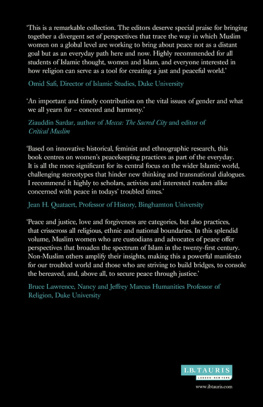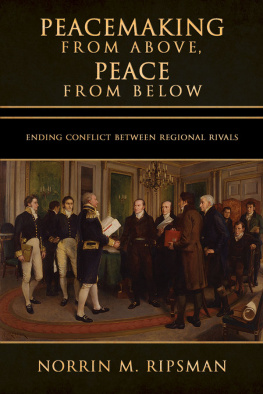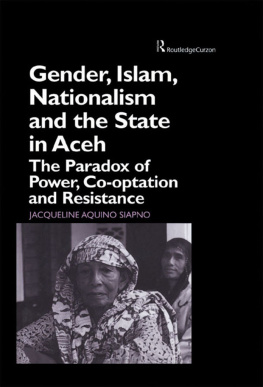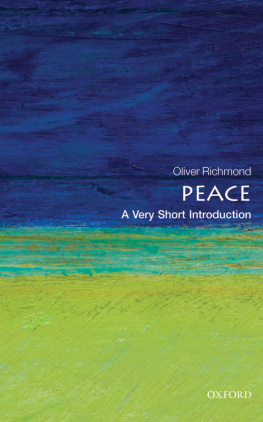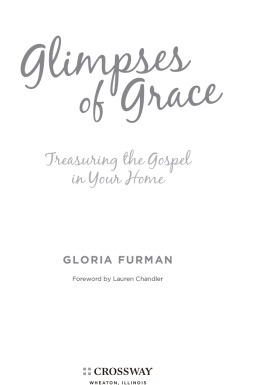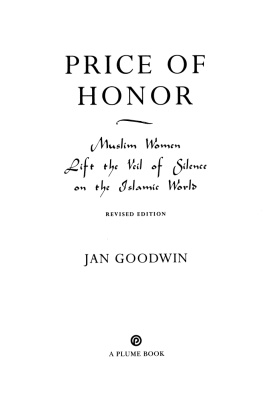
Yasmin Saikia is the Hardt-Nickachos Chair in Peace Studies at the Center for the Study of Religion and Conflict and Professor of History at Arizona State University. Her books include In the Meadows of Gold: Telling Tales of the Swargadeos at the Crossroads of Assam, Fragmented Memories: Struggling to Become Tai-Ahom in India and Women, War and the Making of Bangladesh: Remembering 1971.
Chad Haines is Assistant Professor of Religious Studies and Global Studies at Arizona State University and faculty affiliate with the Center for the Study of Religion and Conflict. He is the author of Nation, Territory and Globalization in Pakistan: Traversing the Margins.
WOMEN AND
PEACE IN THE
ISLAMIC WORLD
Gender, Agency and Influence
Edited by
Y ASMIN S AIKIA AND C HAD H AINES

First published in 2015 by I.B.Tauris & Co Ltd
www.ibtauris.com
Distributed worldwide by I.B.Tauris & Co Ltd Registered office: 6 Salem Road, London W2 4BU
Copyright Editorial Selection, Introduction and Chapters 2 and 10 2015 Yasmin Saikia and Chad Haines
Copyright Individual Chapters 2014 miriam cooke, Richard C. Martin, Elora Halim Chowdhury, Asna Husin, Souad T. Ali, S. Ayse Kadayifci-Orellana, Arzoo Osanloo, Azza Karam, Shahla Talebi, Zilka Spahi iljak, Sally L. Kitch, Daisy Khan and Cemalnur Sargut
The right of Yasmin Saikia and Chad Haines to be identified as the editors of this work has been asserted by the editors in accordance with the Copyright, Designs and Patents Act 1988.
All rights reserved. Except for brief quotations in a review, this book, or any part thereof, may not be reproduced, stored in or introduced into a retrieval system, or transmitted, in any form or by any means, electronic, mechanical, photocopying, recording or otherwise, without the prior written permission of the publisher.
References to websites were correct at the time of writing.
Library of Modern Middle East Studies 164
ISBN: 978 1 78453 017 4
eISBN: 978 0 85773 725 0
A full CIP record for this book is available from the British Library
A full CIP record is available from the Library of Congress
Library of Congress Catalog Card Number: available
To the nameless strangers of Palestine, Pakistan, Iraq and Syria whose
random acts of kindness and hospitality illuminated for us the potential of
peace in the everyday.
CONTENTS
Yasmin Saikia and Chad Haines
miriam cooke
Chad Haines
Richard C. Martin
Elora Halim Chowdhury
Asna Husin
Souad T. Ali
S. Ayse Kadayifci-Orellana
Arzoo Osanloo
Azza Karam
Yasmin Saikia
Shahla Talebi
Zilka Spahi-iljak
Sally L. Kitch
Daisy Khan and Cemalnur Sargut
PREFACE AND
ACKNOWLEDGEMENTS
Women and Peace in the Islamic World has many points of origin. The initial idea of bringing together these collected papers germinated from the international conference, Women, Islam and Peace, funded by the Hardt-Nickachos Peace Studies initiative at the Center for the Study of Religion and Conflict (CSRC) in Arizona State University (ASU). Two faculty seminars we coordinated on Islam and Modernity and Pluralism and the Other in Islam for two years, brought together a dynamic collective of Islamic Studies faculty at ASU, and deepened and expanded our conceptual interests in Islam. These seminars at ASU were funded by ASUs Institute of Humanities Research (IHR) and we are deeply thankful to the IHR for the support.
Out of these research clusters we forged a new and informal group called ISRA (Islamic Studies Research Alliance). The faculty group meets every month and in these gatherings we read, discussed and debated our ideas about the scholarship of Islam and Muslim societies. However, there was a visible dearth of literature on Islam and peace. As well, we found a predictable narrative concerning Muslim women and there was very little variation from the established literature on Islamic feminism and piety. We asked our colleagues to help us to think through our ideas of Muslim women as peacemakers. We were particularly keen to probe how women live Islam and what changes they are able to engender in their communities for peaceful living through accommodation and understanding with different others. This led us to think and read more on the concept of the everyday, because that is where we started seeing Muslim womens work happening and developing something quite unique a new way of thinking and living peace. For us, the two co-editors of the book, it became our lens of investigation for an entire year. We are particularly thankful to Hasan Davalcu, Chouki el Hamel, Nabil Kamel, Jim Rush and Shahla Talebi for the multiple conversations that sharpened our knowledge and thinking on the subject of ordinary Muslim women as peacemakers.
Beyond these academic discussions and deliberations, the Sonoran desert in Arizona has been a source of inspiration. What appears to be the plain and lifeless desert is actually full of living activities. The desert is the ground of fertile renewal, every minute. It is, however, rarely noticed because the on-the-ground activities in the desert are almost invisible and thus imperceptible. Occasionally, the desert comes to life in a dramatic way and puts forth a grand display of multi-colored blooming cacti. Some of these cacti take five, ten, or even 40 years to bloom, and when they do they make the desert dance in splendor. The desert that nurtures this beauty truly is a place of wonder. The desert taught us the everyday is a site of multiple and wondrous happenings and that the potential is endless. The alchemy of the everyday and ordinary people works in a similar combination. At work together, continuously, their efforts promise hope and beauty. This collection is the outcome of the cross-fertilization of ideas that were generated in the international conference, IHR seminars, discussions of the ISRA group, and the book of nature of the Arizona desert. For the heterogeneous origins of this book, we are deeply grateful and have been enriched because of it.
At an individual level, our heartfelt thanks go to the Linell Cady, Director of the Center for the Study of Religion and Conflict. Linell is the best leader one can think of working with for developing a project that is continuously evolving. Our benefactors Professor Ann Hardt, her late husband, Anthony Nickachos, along with ASU President Michael Crow have provided us with the much needed funds for creating a space to think, read and discuss about peace as an intellectual and humanistic endeavour. Our ongoing work on peace studies at CSRC emerges from their support and encouragement.
Carolyn Forbes, Assistant Director at CSRC, has been a great sounding board for our ideas. Carolyn has also helped us in many different ways to see this book to its completion. Matt Correa, Nigah Muhgal and Emily Fritcke at CSRC assisted us with the technical issues as well as research on bibliographies. Laurie Perko, Manager at CSRC, did all the background work to put together the international conference and managed the finances. Jerryll Moreno and Doann Houghton-Alico read and edited the manuscript. We are thankful to this team of people who helped us to produce this book. At I.B.Tauris, our editor Azmina Siddique shepherded the manuscript through the entire process, beginning with the initial proposal to its completion for publication. We are deeply thankful to Cemalnur Sargut for her love and friendship. Each of the individual authors worked to keep the deadline and produce new and original work for this book. We thank them for their trust in our endeavour. The responsibility of the remaining shortcomings of this book is of course our own as editors.
Next page
